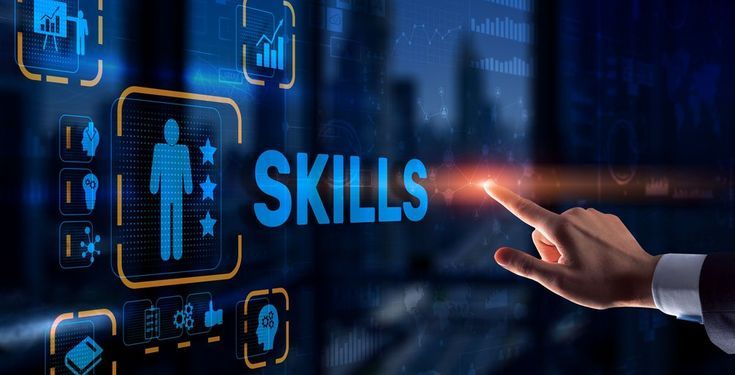Preparing for the Future of Work

As we move into 2025, the Information Technology (IT) landscape continues to evolve at an unprecedented pace. From advancements in artificial intelligence (AI) to breakthroughs in quantum computing, the tech industry demands professionals equipped with the skills necessary to navigate this rapidly changing environment. For those aspiring to thrive in this era of innovation, acquiring the right IT skills will be crucial. Here, we explore the key skills to focus on in 2025 and how they can position you for success in the tech-driven future.
1. Artificial Intelligence and Machine Learning
AI and machine learning (ML) remain at the forefront of technological innovation. These fields drive advancements in automation, data analysis, and predictive modeling, making them indispensable across industries.
Why It Matters:
AI and ML are no longer confined to research labs; they are now integral to everyday applications such as recommendation systems, autonomous vehicles, and medical diagnostics. Companies are investing heavily in AI-driven solutions to enhance efficiency and deliver personalized experiences.
Skills to Focus On:
- Proficiency in programming languages such as Python and R.
- Understanding deep learning frameworks like TensorFlow and PyTorch.
- Expertise in natural language processing (NLP) and computer vision.
- Knowledge of AI ethics and responsible AI practices.
2. Cybersecurity Expertise
The rise of cyber threats and sophisticated attacks has made cybersecurity one of the most sought-after skills in IT. As more businesses adopt digital-first strategies, securing sensitive data and infrastructure becomes paramount.
Why It Matters:
High-profile data breaches and ransomware attacks highlight the importance of robust cybersecurity measures. Organizations require professionals who can anticipate, prevent, and respond to cyber threats effectively.

Skills to Focus On:
- Familiarity with security frameworks such as NIST and ISO 27001.
- Expertise in penetration testing and vulnerability assessment.
- Knowledge of encryption techniques and secure coding practices.
- Understanding of emerging trends like zero-trust architecture.
3. Cloud Computing and DevOps
Cloud computing continues to revolutionize how businesses manage and store data. Coupled with DevOps practices, it enables seamless integration, delivery, and scalability of applications.
Why It Matters:
The shift to remote work and digital transformation initiatives have accelerated cloud adoption. Proficiency in cloud platforms such as AWS, Azure, and Google Cloud is increasingly essential.
Skills to Focus On:
- Mastery of containerization tools like Docker and Kubernetes.
- Understanding infrastructure as code (IaC) using tools like Terraform.
- Proficiency in CI/CD pipelines for automated deployments.
- Cost optimization and cloud security best practices.
4. Data Science and Analytics
Data has become the lifeblood of decision-making. Data scientists and analysts who can extract actionable insights from large datasets are invaluable to organizations.
Why It Matters:
From predicting market trends to optimizing supply chains, data science empowers businesses to make informed decisions. The ability to analyze and visualize data is a critical skill in nearly every industry.
Skills to Focus On:
- Proficiency in data manipulation using SQL and Python libraries such as Pandas.
- Expertise in data visualization tools like Tableau and Power BI.
- Familiarity with big data frameworks like Apache Hadoop and Spark.
- Knowledge of statistical analysis and hypothesis testing.
5. Blockchain Development
While blockchain is best known as the foundation of cryptocurrencies, its applications extend far beyond digital currencies. Industries such as finance, healthcare, and supply chain management are exploring blockchain for secure and transparent transactions.
Why It Matters:
Blockchain technology offers solutions to challenges such as data integrity and fraud prevention. As businesses adopt blockchain, the demand for skilled developers is on the rise.
Skills to Focus On:
- Understanding blockchain architecture and smart contracts.
- Proficiency in programming languages like Solidity and Rust.
- Familiarity with decentralized application (DApp) development.
- Knowledge of consensus algorithms and distributed ledgers.

6. Quantum Computing Basics
Quantum computing is no longer a concept confined to theoretical physics; it is gradually becoming a practical tool for solving complex problems in various fields.
Why It Matters:
Quantum computers promise to revolutionize areas such as cryptography, material science, and artificial intelligence. While still in its infancy, the field is poised for rapid growth.
Skills to Focus On:
- Understanding quantum mechanics principles.
- Familiarity with quantum programming languages like Qiskit and Cirq.
- Knowledge of quantum algorithms such as Grover’s and Shor’s algorithms.
- Awareness of quantum computing applications and limitations.
7. Extended Reality (XR) Development
Extended reality, which encompasses virtual reality (VR), augmented reality (AR), and mixed reality (MR), is reshaping industries such as gaming, education, and healthcare.
Why It Matters:
XR technologies offer immersive experiences that can enhance training, design, and customer engagement. The market for XR applications is expanding rapidly.
Skills to Focus On:
- Proficiency in 3D modeling and game engines like Unity and Unreal Engine.
- Understanding user experience (UX) design for XR applications.
- Familiarity with hardware platforms like Oculus and Microsoft HoloLens.
- Knowledge of spatial computing and gesture recognition.
8. Internet of Things (IoT) Development
IoT connects devices and systems, creating a network of smart environments. From smart homes to industrial IoT, this technology is integral to modern infrastructure.
Why It Matters:
IoT enables real-time monitoring, automation, and optimization. As IoT devices become more prevalent, skilled developers are needed to design and maintain these systems.
Skills to Focus On:
- Proficiency in IoT protocols such as MQTT and CoAP.
- Knowledge of embedded systems and microcontrollers like Arduino and Raspberry Pi.
- Understanding IoT security and data management.
- Expertise in edge computing and real-time analytics.
9. Soft Skills for IT Professionals
While technical expertise is vital, soft skills such as communication, adaptability, and teamwork are equally important in the workplace.
Why It Matters:
As IT projects become more collaborative, the ability to convey ideas, work in diverse teams, and adapt to changing requirements is crucial for success.
Skills to Focus On:
- Effective communication and presentation skills.
- Problem-solving and critical thinking abilities.
- Project management and leadership capabilities.
- Emotional intelligence and cultural awareness.
Preparing for 2025 and Beyond
The IT industry in 2025 will demand a blend of cutting-edge technical skills and adaptive soft skills. Staying updated through continuous learning, certifications, and hands-on experience is essential. Platforms like Coursera, Udemy, and LinkedIn Learning offer resources to help professionals keep pace with technological advancements.
As you chart your career path, focus on areas that align with your interests and the needs of the industry. By acquiring these in-demand IT skills, you can position yourself as a valuable asset in the future workforce and contribute to shaping the technology of tomorrow.

